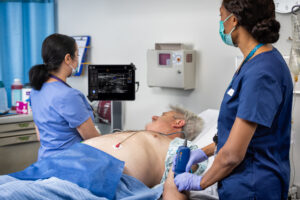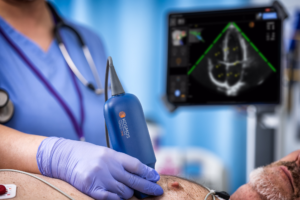Elevating Nephrology with POCUS

Dr. Eduardo Argaiz
MD, PhD
Luke Baldwin, the Vice President of Global Marketing at EchoNous, recently sat down for a conversation with Dr. Eduardo Argaiz, MD, Ph.D about the role of Point-of-Care Ultrasound (POCUS) in his discipline.
Dr. Argaiz is a well-known and respected figure in the field of nephrology, recognized for his efforts in integrating POCUS technology into renal care practices. With a wealth of experience and a commitment to advancing nephrology, Dr. Argaiz is reshaping patient care paradigms within the field.
Meet Dr. Eduardo Argaiz
Dr. Eduardo Argaiz is an internist and attending nephrologist based in Mexico City. Before he became involved with integrating ultrasound into clinical practice, Dr. Argaiz discovered POCUS’s potential during his residency.
With an MD and a PhD in molecular biology, Dr. Argaiz bridges science and patient care. He also serves as a Board Member at the Mexican Society of Echocardiography – National Society of Echocardiography of Mexico, shaping echocardiography practice and promoting excellence in cardiovascular imaging.
Dr. Argaiz’s research, focusing on cardiorenal syndromes and hemodynamic assessment using POCUS, gaining international recognition. He advocates for POCUS adoption in nephrology through publications and conference presentations. As a board member, Dr. Argaiz promotes POCUS education among healthcare professionals, aiming to enhance patient care through innovative technology integration.
Dr. Argaiz's Journey into Nephrology and POCUS
Dr. Argaiz’s journey into nephrology and POCUS is a testament to curiosity, collaboration, and dedication to enhancing patient care. Dr. Argaiz embarked on a unique path, combining clinical training with a PhD. in molecular biology before returning to clinical practice. During his internal medicine residency, he stumbled upon the potential of POCUS through a podcast by Dr. Philippe Rola.
Reflecting on his journey, Dr. Argaiz recalls, “I remember thinking this was crazy; who was doing this? I read all the literature on heart failure, and nobody’s mentioning the portal vein [Doppler], so this Philippe Rola guy must be crazy.” However, curiosity about Rola’s work with ultrasound and heart failure led him to delve deeper into POCUS, particularly in the context of cardiorenal syndrome.
Driven by a desire to improve patient care, Dr. Argaiz began incorporating POCUS into his clinical practice and sharing his experiences on social media. Collaborating with experts, including Dr. Rola, he conducted groundbreaking research and presented his findings at national meetings, garnering attention and recognition for his work in the field.
As he continued refining his POCUS skills, Dr. Argaiz recognized its potential in nephrology, an area where ultrasound was underutilized. He pushed for the integration of POCUS into nephrology practice with colleagues, improving hemodynamic assessment for patients with conditions like hepatorenal syndrome and cardiorenal syndromes.
Reflecting on his journey, Dr. Argaiz emphasizes social media’s role in accelerating knowledge dissemination. “Social media has changed how you can present your ideas to the world… We can reach way more people instantaneously,” he notes. Through platforms like X/Twitter and Instagram, Dr. Argaiz has shared clinical cases, engaged with colleagues worldwide, and advocated for adopting POCUS in nephrology.
The Role of POCUS in Nephrology: Enhancing Diagnosis and Patient Care
Dr. Argaiz sheds light on the role of POCUS in nephrology, emphasizing its pivotal contribution to enhancing diagnosis and patient care. Traditionally, nephrologists have relied on conventional methods such as urine examination and creatinine levels to evaluate kidney function. However, the introduction of POCUS into the discipline has revolutionized this approach by enabling real-time hemodynamic assessments at the bedside. This advancement has empowered nephrologists to delve deeper into conditions like hemodynamic acute kidney injury and cardiorenal syndrome, thus offering more comprehensive and precise patient management strategies.
Dr. Argaiz underscores the significance of POCUS in nephrology, saying, “Nephrology has significant applications for point-of-care ultrasound…[For example,] we are elevating the game [by] assessing further why your patient is not producing urine?.”
Through POCUS, nephrologists can now go beyond traditional diagnostic methods and gain valuable insights into patients’ hemodynamic status. This paradigm shift has enhanced diagnostic accuracy and paved the way for more targeted and effective therapeutic interventions. By integrating POCUS into their practice, nephrologists are better equipped to address renal pathophysiology’s complexities and provide optimal patient care.
Advocacy and Education
Dr. Argaiz’s advocacy for POCUS adoption in nephrology extends beyond research and clinical practice. He actively promotes POCUS education among healthcare professionals, recognizing its potential to enhance patient care and improve outcomes. Through publications, conference presentations, and his role as a board member, Dr. Argaiz continues to drive the integration of POCUS into nephrology, ensuring that clinicians have access to the latest advancements in diagnostic technology.
Stay tuned for our two part Q&A interview, where Dr. Argaiz delves deeper into the applications of POCUS in nephrology and shares insights into his educational initiatives in Latin America.
To learn more about Kosmos, contact us today!



